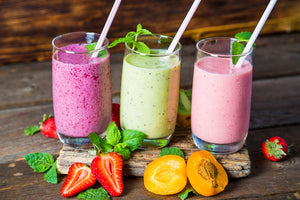
If you thought protein was just for young people spending hours in the gym working on a certain physique, think again. Protein is just as important, if not more, for older adults.
Aging is hard on the body, and protein is one of the building blocks to keep the whole body functioning as best as possible.
Here are some of the most important reasons to eat adequate protein that go beyond muscle growth.
Muscle Preservation
Your muscles always benefit from protein, even when your heavy lifting days are over. One unfortunate, but common result of aging is muscle wasting.
The medical term for this is sarcopenia, and it can actually start happening as early as sometime in your 30’s. It tends to speed up around the time you turn 65.
If you’re inactive, you can lose 3 to 5 percent of your muscle mass each decade after you turn 30. If you stay active, you can slow the rate of muscle wasting.
As you lose muscle mass, you lose strength and endurance. This increases your risk for injury and eventually makes it more difficult to remain independent. Sarcopenia is one major cause of falls and fractures in elderly people.
Exercise, especially with weights, is the best treatment for sarcopenia. Getting enough protein supports the muscle’s effort to preserve mass and strength.
The most common recommendation for optimal protein intake to prevent sarcopenia is 1.0 to 1.2 grams of protein per kilogram bodyweight. Others recommend consistently getting 25 to 30 grams of protein per meal.
Bone Health

You need protein to maintain structure in all tissues in the body, not just the muscle. Just as your muscle mass diminishes as you age, so does your bone mass.
Most people start losing bone mass by the time they are 40 years old. Over time, the bones become thinner and more frail. Eventually, some may develop osteoporosis and a much higher risk for fractured or broken bones.
Many factors go into bone health, especially as we age. Exercise and nutrition are two major factors that we actually have some control over.
You’ve probably heard about increasing calcium and vitamin D for bone health. Protein is another important piece of the nutrition puzzle.
Protein increases muscle mass, which protects the bone from injury. Protein also helps your body absorb calcium and plays a role in hormone balance. These hormones affect bone density.
Weight Management
Some of us gain weight as we age due to a slowing metabolism. Weight gain is more likely to occur around the midsection in older adults, which increases the risk for disease.
Some of us, especially even later in the aging process, unintentionally lose weight.
In fact, 15 to 20 percent of adults older than 65 years experience weight loss of 5 percent or more with no known cause. This type of weight loss can lead to a lot of issues down the road, including a higher risk for morbidity and mortality.
Protein can help in either situation. A high protein diet makes a meal feel more satisfying and keeps you feeling that way longer.
One cause of unintentional weight loss is muscle wasting. As we talked about before, protein helps your body maintain muscle mass. Protein also helps to avoid malnutrition.

Blood Pressure Control
Protein’s role in cardiovascular health is less talked about, but extremely important.
As we age, the risk for stroke and other cardiovascular emergencies increases. Certain factors like high blood pressure increase that risk.
A high protein diet can actually lower the risk of developing high blood pressure.
One study found that eating an average of 100 grams per day decreased the risk of having high blood pressure by 40 percent, compared to those eating a low protein diet.
One in three Americans has high blood pressure, which tells us nutrition is something all of us should be thinking about as we age.
Immune Health
When we want to avoid illness and stay healthy, we immediately jump to eat fruits and veggies and supplement vitamin C. Even though these foods are great for the immune system, your body also needs protein to fight off illness.
The immune system is complex. The structure of our cells, the lining of our organs, blood vessels, intestines, and skin is key to keeping infection out. Unfortunately, this structure tends to deteriorate as we age.
The body also produces fewer immune cells as we age. All of these factors increase the risk for infection and illness and make it harder for our bodies to fight them off.
But protein can help. Not only does it support the structure of organs and cells in the body, but it’s a critical nutrient for building immune cells.
Energy Levels and Brain Function

When carbohydrates break down into glucose, protein helps your body absorb the glucose more slowly. This helps to stabilize energy levels, keeping you from feeling sluggish throughout the day. Energy levels naturally decrease with age, but protein can help keep you going throughout the day.
If you’re struggling to think clearly. Protein nourishes brain tissue and helps neurons communicate with each other. Certain amino acids from protein are known to support memory and brain function in aging, and even prevent cognitive disease.
How to Eat More Protein
Include a serving of high-quality protein with every meal. Some good sources include the following:
- Lean meat
- Poultry
- Fish
- Eggs
- Dairy
- Tofu
- Legumes
- Nuts
If appetite is decreased. Try to eat a source of protein before other foods on your plate.
If you’re too busy to prepare protein-rich meals multiple times a day, you can also make sure you eat enough by drinking a tasty and nutritious Naked Shake in the morning to start the day right.
If you’re unsure how much protein is right for you every day, then check out our protein calculator.

Protein is Invaluable for Everyone, but Especially Seniors
Protein is a key nutrient during all of life’s phases, but it is arguably most important as we age. Eating enough protein can make a huge difference in many negative aspects of aging.
Not only will getting enough protein to keep you strong, but it will help you stay independent, maintain balance, prevent injury, slow bone loss, balance hormones, manage your weight, keep your cardiovascular system healthy, and optimize tissue repair throughout your body.
These are all very important things to feel your best and stay healthy as long as possible.










